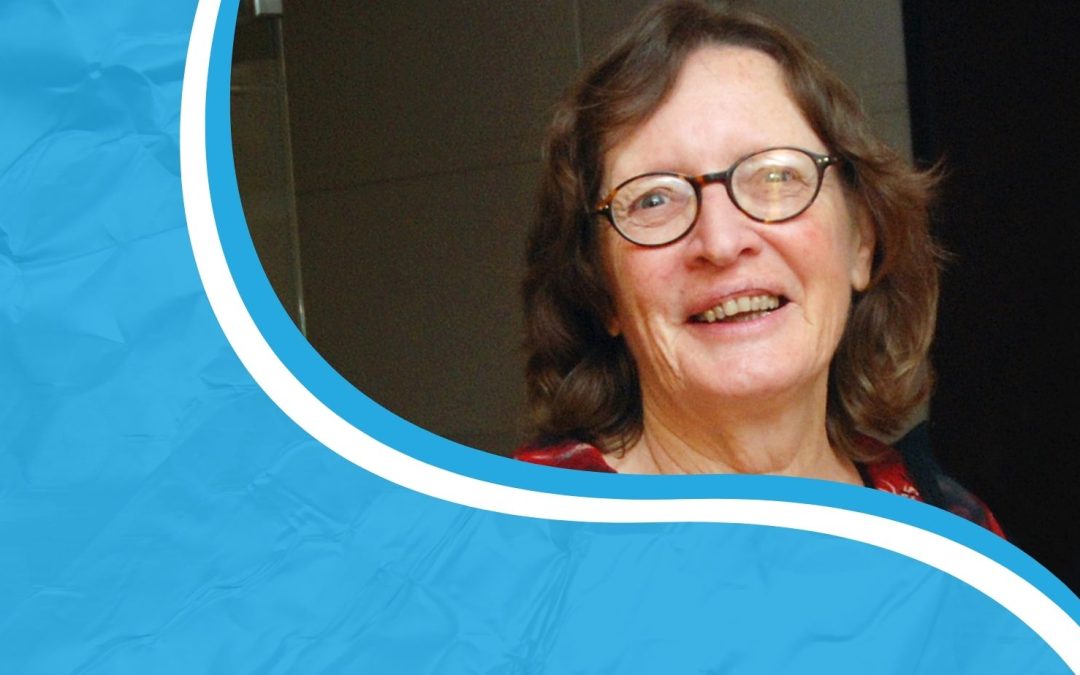By Michèle Drouart HLM
For our history – and to pass on something of the living, breathing people among our founders and early mentors – we are adding to our cameo of Janet Mackenzie. It is in Janet’s name that IPEd offers its most prestigious award, the Janet Mackenzie Medal, for services to the profession and to IPEd. We’d like to give a clearer sense of the person Janet was and how that fed into all she did. Her editing was only a part of the great human being she proved to be.
Al Rozefsky, Janet’s partner of many years, has contributed material that gives a much fuller picture of Janet. The phrases quoted here are from Al’s notes to us in her memory. (1) He emphasises her enthusiasm, her wide variety of interests and the “innovative solutions and ideas” she came up with throughout her life. We must add to this a love of adventure and a boundless energy – to go by her travels and the many roles she took on.
Janet’s 2 years of mostly hitchhiking took in such diverse countries as the Faroe Islands, Iceland, India, Israel, Kenya, countries in the regions of North and Central Africa, and Norway, all well before Lonely Planet came into existence.
It was in Ireland that she met Al, and by the 1970s, back in Australia, they had their son Sam and daughter Rosie. That was when Janet began editing work with different publishers, brandishing the blue pencil and driving manuscripts along bush tracks to the post office. It was also when she started writing poems and songs regularly and playing her guitar and banjo.
Janet was always “pushing the boundaries”. Her first full-time job at Melbourne University Press (MUP) saw her being “called into the office and given a dressing down” for wearing a pants suit. She was told to “go home and change into proper attire for a professional office like MUP”. In the early 1980s Janet became “the first employee of the Euroa Shire Library Service to insist that they allow her to job-share the running of the library”.
As an editor, Janet was the inaugural president of the first Australian editing society – the Society of Editors (Victoria), founded in 1970. She also set up the Australian standards for editing practice (2001), wrote The editor’s companion (2004), and helped to establish IPEd as well as its accreditation exam (2008). Beside all these activities, Janet had a wide variety of interests and pursuits that made for a full life outside the editing world. In these areas, too, her efforts came to fruition in ways that proved to be well ahead of their time. Among them was her caring for the environment.
In the late 1980s Janet established a national grass roots organisation to inform people of what they could do for the environment individually and at the local level. Called Householders Options to Protect the Environment (HOPE), this organisation grew out of a speech she had made in 1988 on how “ordinary people can make a difference by raising awareness and initiating actions to solve local environmental problems”. When her speech resonated with fellow Australians keen to make a difference concerning the environment she created the HOPE charter – the “HOPE Generator” – that provided information, contacts and resources to help people lessen their impact on the environment. Her words were “everyone can do something, no matter how small”, and this led to the opening up of 80 new HOPE “hubs” across Victoria, proving the validity of her added statement: “maybe tomorrow they’ll do more”. Other states soon followed, all supporting the slogan “Think globally, act locally”. Janet was also a State Parliament Greens candidate in the 1980s.
All tasks Janet performed she carried out meticulously, but never without energy, love and enthusiasm. In that spirit she became a founding member of Rural Australians for Refugees (RAR) and also of friendship groups initiated by the then Consul-General for East Timor, Abel Guterres (later its ambassador). This was how the town of Mansfield became the Friends of Venilale, a mountainous village in Timor-Leste.
Janet’s love of the word – and of the arts generally – also found expression in the theatre. For her contributions over many productions, the Mansfield Musical and Dramatic Society (MMuDS) awarded her life membership. She even wrote poems about the productions that were staged and the people in them.
A later project Janet devoted her meticulous research to was writing about the role of her early relative in World War I, Red Cross Nurse Lily Mackenzie. Along with that of 7 other families, her work featured in the Museums Victoria exhibition of 2014–2018 titled WWI: Love & Sorrow.
Janet was one of a group of dedicated editors whose tireless efforts helped to bring the editing societies in the different states together to become branches of the newly established IPEd (2008), joined by New Zealand in 2018. Professionalism, pay and promotion were 3 of the main aims of the organisation, and still are. Janet’s concern for networking, advocacy and sustainable rates and conditions were simply a reflection of her values, with justice, fairness and equal opportunity at their core.
Janet sought “excellence” in everything she did, but “not for personal recognition”, as her sister-in-law in the United States, Nancy Rozefsky Moffitt, has noted: “rather, it was accomplished in her own quiet way for the betterment of others and for the growth of the editing profession”.
(1) Quotes in this story have been sourced from Al Rozefsky, including his own words about Janet, his records of Janet’s writings and speeches, and the words of her sister-in-law.
For more on Janet’s story and work with IPEd, visit the IPEd awards page.

